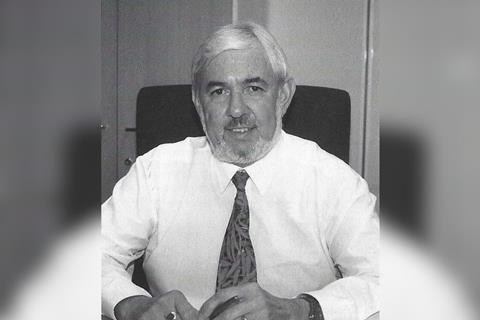One of the most well known and high profile meat men of the 1980s and 1990s, Brian Kilkenny, died on 4th January aged 81.

Brian was best known as the high profile trade marketing manager of the Meat and Livestock Commission (MLC) during a period when the Commission had large promotional budgets, both for trade marketing and consumer advertising.
At the time of Brian’s role, both Quality Meat Scotland and HCC / Meat Promotion Wales came directly under MLC budgeting before devolution of the home nations meant more autonomy for these separate organisations, which eventually led to the creation of AHDB and the demise of MLC. Before his retirement in August 1999, Kilkenny had the say over many millions of pounds from the Winterhill head office used to promote red meat and support all types of activities and initiatives.
The entire trade was actively supported from independent retail butchers through to supermarket promotions including manufacturing initiatives and the display and promotion of red meat, with a joined up approach to both consumer and trade activities. Organisations such as the Q Guild can be thankful for the backing of Brian Kilkenny who was a champion of the new organisation that he helped to foster and develop.
Education
Always a bright student, Brian went to Hull Grammar School before going on to Leeds University. He chose to read Agriculture – a four year degree course and he graduated with first class honours. He then stayed on for another year to take a statistics qualification.
During his time at university Brian was an enthusiastic and well regarded rugby player, but was unusual in mixing rugby union with rugby league, describing himself as a ‘renegade’ by having his feet in both camps!
After university he took a post in Tanganyika, Africa (as it then was) seeking and testing animal feedstuffs before moving on to BOCM. His main start in the meat industry however came about in 1966 when Brian joined the Beef Recording Association in Reading before then moving on to the MLC under its first livestock director Ken Baker.
Located at the Commission’s Bletchley offices, there were only small resources for beef recording at the time and none for sheep, so Brian, along with his colleague Joe Read, pioneered the growth of the department to which he was attached until 1980.
Brian’s big break at MLC came in 1984 under director general Chris Oberst, when the Meat Promotions Executive became more integrated into MLC. This led to Brian’s appointment in 1986 as head of trade marketing and his work and pragmatic style of leadership was a big part in developing its sophistication and effectiveness.
Trade development
Brian was a master at recognising changing trends, particularly in the preparation and consumption of meat. Under his direction, along with colleagues such as Keith Fisher and Andrew Garvey, there was an acceleration of development with mini joints and new cuts and fresh ideas for catering coming in, which were then often taken up in retail markets.
Working with top chefs and schools was introduced as a new concept and there followed a ‘purple patch’ period of innovation with the creation of new ideas driving great progress. Brian was a big believer in establishing a meat eating habit with young people.
After his retirement in 1999 Brian became a magistrate for some years and also enjoyed gardening and sport.
Publisher of Meat Management magazine Graham Yandell MBE commented: “I first met Brian in the early 80s. He was a larger than life character and knew his industry inside out. He definitely knew his own mind and was a confident and hard working executive of great talent. He was not always easy but he got results and could be great fun.
“A man of vitality and enthusiasm I shall remember him as a game changer and a man who embodied positive thinking and a can do attitude, characteristics that are not always readily found today. I believe the meat industry owes a great debt to Brian Kilkenny. At the time he actively embraced change and made things happen and, whilst he could be single minded at times – at times that is just what is required to get important work done. I shall remember him with great fondness and admiration.”















